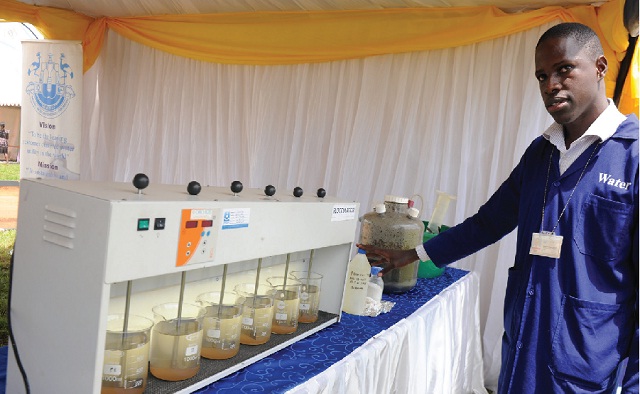
biogas system that would generate electricity. Independent/Jimy Siya .
Edward Kirumira, the Principle of the College of Humanities and Social Sciences at Makerere University, who was the keynote speaker at the event said water and environment are critical enablers and indeed drivers in the three key areas for ensuring Uganda’s development targets; namely demographic transition, income growth acceleration, and exchange rate movements.
He said the government and other sector players need to think, work together, and act on having high quality water and safe environment to drive the country’s expenditure patterns downwards.
His address was titled; Uganda’s move to middle income status; potential role of the Water Resources Institute which he related to the theme of the event which was “Water and Environment, a catalyst for achieving middle income status 2020”.
He said, hopefully, achieving the middle income status in Uganda would not come about “because some few people have been incredibly richer and not necessarily because the majority of Ugandans are less poor”.
Successful water week
The event was so successful that some participants are already looking forward to the next one in 2019.
“We are looking forward to taking part in similar events in the future,” said Daniel Ssemaganda, the Water, Sanitation, and Hygiene (WASH) officer at Fields of Life, a regional NGO involved in building water infrastructure for vulnerable communities in Uganda.
He said the event had linked them to new partners and helped them share success stories of their work to the general population.
He said their goal is to show how they support and complement government work and share their future plans.
He described how over the years, they have constructed 661 boreholes for 72 households serving mainly people in the war-torn Northern Uganda region.
“The exhibition is so far so good, and we are very delighted to be part of it,” said Joseph Niwagaba, the Commercial Officer at National Water and Sewerage Corporation – Entebbe Branch.
He told The Independent that they were taking part in the event to showcase innovations they have, including making biogas to generate electricity.
“We are impressed with the questions people are asking us,” said Janet Akello from the National Meteorological Training School. They exhibited and shared information on weather and climate information and equipment – the kind of things people hear about but never see physically.
“We hope to be part of this event in the future,” she said.
 The Independent Uganda: You get the Truth we Pay the Price
The Independent Uganda: You get the Truth we Pay the Price


